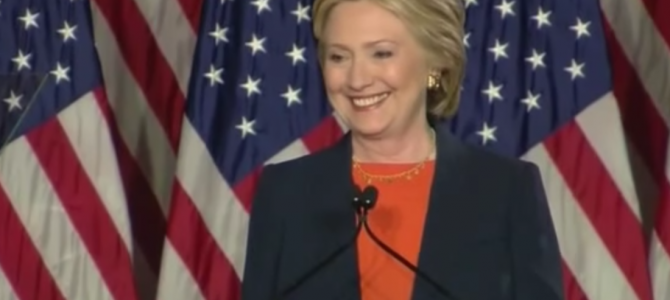Hillary Clinton gave a speech on foreign policy yesterday in San Diego, on a stage packed chock-full of American flags. Here are a few quick thoughts on what was billed as a “major foreign policy address.”
1) The Strategy: Mock Trump
The speech was supposed to unveil Clinton’s foreign policy, but really it unveiled how she plans to go after Donald Trump in the general election. Republican opponents mostly avoided taking on Donald Trump until it was too late. Clinton seems to be eager to take him on and define him as erratic and untrustworthy to handle nuclear launch codes. The speech was filled with insults about Trump. Clinton simply quoted him and the crowd laughed in mockery.
And it was strategically written. She said, “We all know the tools Donald Trump brings to the table – bragging, mocking, composing nasty tweets – I’m willing to bet he’s writing a few right now.”
It’s a good line! If he doesn’t tweet anything at her, it will seem like she’s scared him into silence. If he does, she’s already pre-rebutted it.
It will be interesting to see how Trump responds — his initial tweets and words at his rally in California weren’t particularly noteworthy — or if he considers a response necessary. As for Clinton, it will be interesting to see how well her framing of Trump as an erratic child will work. But it’s the first sign of a strategy. Will she stay calm and focused in this approach? Staying above the fray while Trump lobs his verbal grenades? And is working to ensure Trump is viewed more negatively wiser than working on her own favorables?
2) A Very Conventional Campaign Pseudo-Event
Particularly in contrast to Donald Trump’s unconventional campaign, yesterday’s speech was a reminder of how political campaigns used to be. The Clinton campaign made “foreign policy” the message of the day. A speech was drafted and edited for maximum effect. The media were put on high alert that the topic of the day was to be foreign policy. Surrogates were lined up to reinforce the message afterwards. The media rollout was very successful insofar as it goes. The speech dominated news coverage both in its anticipation and aftermath.
But one problem with both the media coverage of 2016’s campaign and Clinton’s response to Trump is that both seem to think that repeatedly pointing out that Trump is non-conventional and Clinton is the embodiment of conventional will help Clinton. Is there sufficient reason to think that’s the case? Or, in fact, is Trump’s complete renunciation of all political wisdom the key to his success? Do voters even care about major foreign policy addresses? Even those that are really just part of a strategy to define Trump even more negatively than people view him currently?
3) Trying to Set Aside a Troublesome Foreign Policy Track Record
Hillary Clinton’s campaign advisors had long claimed — in the months leading up to her official announcement — that she would run on her foreign policy experience. The former secretary of state, during her tenure, made sure that she got credit for invading Libya and orchestrating the Russian “reset.”
But both of these major accomplishments turned out to be disasters. And with the Middle East continuing to pose problems, and the Obama administration finding its regional solution in a controversial nuclear deal with Iran, this campaign strategy became hard to realize.
In yesterday’s speech, she tried to discuss foreign policy without getting into too much discussion of her own errors. She avoided Libya but forgot to avoid Putin.
She tried to reframe her foreign policy credentials by speaking generally about her experience and temperament. When it came to policy specifics, she was a bit light. The speech, as is the case with so many American politicians, was focused on problems in the Middle East at the expense of China and other hot spots.
4) ‘I’ve Thought about This’
The vacuum is so great this year in terms of policy, leadership, and reassurance, that simply conveying “I’ve thought about this” is a huge messaging win. Clinton more than cleared that bar, a few days after her opponent Donald Trump was shown to not know much about the United Kingdom’s possible exit from the European Union.
5) Pivot to General
Clinton is a liberal with a progressive base that is more likely to think “climate change” than “Russia” when hearing about global threats. This speech was a major pivot to the general. It went after Trump, not Sanders. It didn’t cater to the whims of the more extreme factions of the Democratic Party. And, relatedly, it extended olive branches to national security hawk Republicans. And even Republicans who, contra Trump, thought Ronald Reagan was a great president.
Trump says over and over again, “The world is laughing at us.” He’s been saying this for decades, he didn’t just start this year. He bought full-page ads in newspapers across the country back in 1987, when Ronald Reagan was President, saying that America lacked a backbone and the world was – you guessed it – laughing at us. He was wrong then, and he’s wrong now – and you’ve got to wonder why somebody who fundamentally has so little confidence in America, and has felt that way for at least 30 years, wants to be our President.
She recently defended Republican women who had been attacked by Trump as well. This is a good strategy to expand the possible pool of voters.
6) Improved Speaking Style
Hillary Clinton’s speaking style is so robotic and unnatural that even Garrison Keillor was mocking it on Prairie Home Companion last weekend. Ace, from Ace of Spades, says a friend who impersonates her halting style for fun describes it as if she’s calling out the answer on Wheel of Fortune. She still suffered from that problem in this speech. However, she’s improving. She gave her speech slowly and deliberately and seemed slightly more natural.









